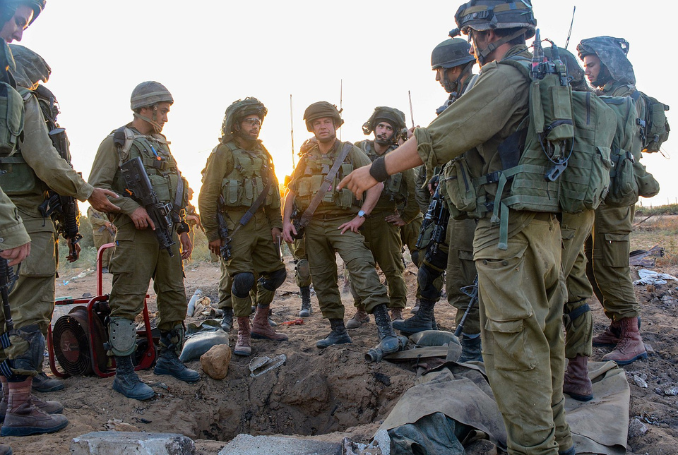By Romana Rubeo 
In the article, Harel illustrates several critical issues that are making it particularly difficult for Tel Aviv to prolong this phase of the war.
In an article published on Friday in the Hebrew edition of the Israeli newspaper Haaretz, Israeli journalist and political analyst Amos Harel argued that there is “a large gap, almost unbridgeable” between Israeli politicians’ statements and the reality in Gaza.
In the article, Harel illustrates several critical issues that are making it particularly difficult for Tel Aviv to prolong this phase of the war. According to Harel, Israel may soon be forced to demobilize reserve soldiers and create a buffer zone in Gaza.
These are the main takeaways of the article.
On the Reservists
According to the article, the recruitment of hundreds of thousands of reservists places an “enormous burden” on the Israeli economy, the reservists themselves, and their families.
This entails the “need for a fundamental change”, according to the journalist.
“It will be necessary to make multiple adjustments, and to release some of the reservists to their homes, in order to continue the war in the new format”.
In this video, Al-Qassam Brigades fighters are seen clashing with enemy forces in the village of Al-Magharqa, north of the central region.
FOLLOW OUR LIVE BLOG:https://t.co/XtkAX0TslN pic.twitter.com/y9mlCnrRW1
— The Palestine Chronicle (@PalestineChron) December 22, 2023
On the Buffer Zone
Harel believes that one of these adjustments should be the creation of a ‘buffer zone’ separating Gaza from Israel.
The report noted that “the Israeli settlements along the border” are “still abandoned” and that “many of them will require a long time to restore the extensive damage caused by Hamas” on October 7.
According to Harel, the “nature of the activity” will change “from the control of most of the territory in the north of the Gaza Strip and a relatively small part of the south (…) to targeted raid operations” against Hamas’ strongholds.
On the Northern Border
Harel argues that the “Northern Command reserve personnel will be released and replaced by regular units, which will further strengthen the Lebanese border as long as there is no solution to the crisis with Hezbollah”.
“In practice, Hezbollah enforced a security strip on Israel’s territory, and kept all Israeli citizens away from the border,” the report noted.
In this video, Hezbollah fighters targeting the farms of the Doviv settlement on the Lebanese-Israeli border.
FOLLOW OUR LIVE BLOG:https://t.co/XtkAX0TslN pic.twitter.com/1hMOe1xnwx
— The Palestine Chronicle (@PalestineChron) December 22, 2023
On the Issue of Time
“Time is a critical element in any military action plan, but in Gaza things are different,” Harel noted, adding that,
“The ground maneuver in Gaza began eight weeks ago, but in recent weeks most of the progress of the Israeli forces (…) has been reduced to fairly minor movements.”
Harel explains the “slowness” with the “fear of more casualties” and the “desire not to harm the (Israeli) abductees.”
However, evidence presented by Palestinian Resistance groups and accounts of Israeli soldiers who operated in the Strip seem to indicate that the “slowness” is largely depending on the stiff resistance on the ground.
On the Tunnels
In fact, Harel acknowledged the “heavy resistance from Hamas” and the “high number of IDF casualties”, which are reportedly preventing the Israeli army from reaching the goal of finding and dismantling tunnels.
“From the IDF’s publications from combat, there is no evidence that the army sends fighters deep into the tunnels. Soldiers only enter a few tunnels, which were first carefully scanned and isolated,” the report noted.
Harel also admitted that “it is becoming clearer that Israel had no sufficient intelligence on what is being done by the enemy.”
On the Sense of Achievement
According to Harel, “the effort of the IDF spokesman to maintain a sense of achievement in the public is now evident”.
“However,” the report added, “it seems that the effect of this awareness campaign on the Israeli public is diminishing.”
“From the point of view of the army, over time there is a danger that the public will lose faith in the credibility of the announcements, and doubt the achievement of the war’s goals,” Harel warned.
In this video, Al-Qassam Brigades fighters are seen targeting an infantry force made up of five soldiers with an anti-fortification shell and clashing with them northwest of the city of Beit Lahia.
FOLLOW OUR LIVE BLOG:https://t.co/XtkAX0TslN pic.twitter.com/n70jSQFKqJ
— The Palestine Chronicle (@PalestineChron) December 22, 2023
On Political Divisions
The report also highlighted the “growing rift” between Netanyahu and his Likud party on one side and ministers of the war cabinet Benny Gantz and Gadi Eisenkot on the other.
Moreover, Netanyahu must contend with the continued threats by the most extremist wing of his far-right government, namely Israel’s National Security Minister Itamar Ben-Gvir and Finance Minister Bezalel Smotrich.
“Not a day passes without ministers Itamar Ben-Gvir, Bezalel Smotrich, and sometimes some Likud ministers, demanding the continuation and acceleration of the war. This is happening while they are threatening to withdraw if the military move is reduced,” according to the article.
“In practice, a situation has arisen in which Israel’s political and security systems are frozen in the face of the unfounded expectation of rapid dismantling and destruction that were not on the agenda before, despite the promises of Netanyahu and others,” Harel continued, adding:
“Parts of the Israeli public really believed that within a few weeks the IDF would clear the Gaza Strip of buildings, and build a park in the north of the Strip, opposite the settlements that were destroyed in the massacre.”
On Phase Three
“In view of the congestion in the south, and the developing challenge in the north, moving to phase 3 of the war in the Strip seems to be a desirable move under the difficult circumstances,” the report said.
“Chief of Staff Halevy, who seems to have already digested the change in the situation, will have to explain to the cabinets whether in his opinion the time has come to move relatively quickly to the more limited phase three,” it added.
(The Palestine Chronicle)

– Romana Rubeo is an Italian writer and the managing editor of The Palestine Chronicle. Her articles appeared in many online newspapers and academic journals. She holds a Master’s Degree in Foreign Languages and Literature and specializes in audio-visual and journalism translation.
The post Bad News from the Front – Top Israeli Analyst on War Gone Bad and the ‘Unbridgeable Gap’ appeared first on Palestine Chronicle.

